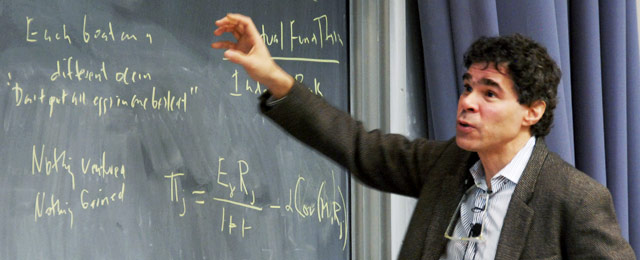Courses tagged with "Structural+engineering" (87)
Kursbeschreibung
Dieser Kurs gibt einen Überblick über grundlegende Modelle, Theorien und Prinzipien der Betriebswirtschaftslehre. Er basiert auf einer mehrfach ausgezeichneten äquivalenten Lehrveranstaltung an der RWTH Aachen und wurde bislang von über 10.000 Studierenden erfolgreich in Aachen absolviert. Der Kurs beginnt mit den Fragen, warum es Unternehmen gibt und was der Kern unternehmerischer Wertschöpfung ist. Anschließend wird analysiert, welche Alternativen und Theorien es zur Organisation von Unternehmen gibt. Ein Schwerpunkt auf die neue Institutionenökonomie erlaubt dabei einen Einblick in einen der Ansätze, der das moderne Management entscheidend geprägt hat. In den letzten beiden Teilen werden Prinzipien der operativen und der strategischen Planung sowie Wettbewerbsstrategien behandelt. Anhand ausgewählter Konzepte lernen die Teilnehmenden die wichtigsten Ansätze des strategischen Managements kennen.
Planspiel
Als besonderes Feature gibt es zu der Veranstaltung das BWL-MOOC Planspiel der Firma Simucate. Das Planspiel: Es bietet Ihnen eine interaktive Möglichkeit, die Studieninhalte gleich praktisch anzuwenden und so besser zu verstehen. Das Planspiel ist in allen Klausurpaketen enthalten. Zusätzlich kann es während des Kurses für 19 Euro hinzu gebucht werden. Sollten Sie sich dazu entscheiden, den ECTS-Track zu belegen ist das Planspiel für Sie bereits inklusive. Die Ergebnisse des Planspiels fließen dann zu 20% in die Endnote der Veranstaltung mit ein.
Was lerne ich in diesem Kurs?
- Du kennst grundlegende Denkweisen der Betriebswirtschaftslehre.
- Du kannst wesentliche Fachbegriffe ebenso wie grundlegende Konzepte auf aktuelle Fragestellungen übertragen.
- Du kannst einen Bezug zwischen den theoretisch vermittelten Kursinhalten und der unternehmerischen Praxis herstellen.
- Du bekommst eine kritisch-reflektierte Herangehensweise an wirtschaftliche Fragestellungen.
- Du bekommst einen Rahmen für weitere vertiefende Vorlesungen im Bereich BWL.
Welche Vorkenntnisse benötige ich?
Die Teilnahme ist ohne spezielle Vorkenntnisse möglich. Mathematik auf mind. Oberstufenniveau ist für Modul 5 erforderlich.
Kursstruktur
Dieser Kurs besteht aus 7 Modulen von jeweils 2 Wochen:
Modul 1: Grundzüge und Funktionen der Unternehmung
Videos ab 02. Nov, interaktive Vorlesung in Aachen am 02. Nov 2015
Modul 2: Organisationstheorien: Der Weg zum Taylorismus und dessen Überwindung
Videos ab 16. Nov, interaktive Vorlesung in Aachen am 16. Nov 2015
Modul 3: Gestaltung der Organisationsstruktur
Videos ab 30. Nov, interaktive Vorlesung in Aachen am 30. Nov 2015
Modul 4: Neue Institutionenökonomik
Videos ab 14. Dez, interaktive Vorlesung in Aachen am 14. Dez 2015
Modul 5: Operative Planung
Videos ab 11. Jan, interaktive Vorlesung in Aachen am 11. Jan 2016
Modul 6: Strategische Planung & Wettbewerbsstrategie
Videos ab 25. Jan, interaktive Vorlesung in Aachen am 25. Jan 2015
This course explores the theoretical and empirical perspectives on individual and industrial demand for energy, energy supply, energy markets, and public policies affecting energy markets. It discusses aspects of the oil, natural gas, electricity, and nuclear power sectors and examines energy tax, price regulation, deregulation, energy efficiency and policies for controlling emission.
This course explores the theory behind and evidence on regulatory, tax, and other government responses to problems of market failure. Special emphasis is given to developing and implementing tools to evaluate environmental policies. Other topics include cost-benefit analysis, measurement of the benefits of non-market goods and costs of regulations, and the evaluation of the impact of regulations in areas such as financial markets, workplace health and safety, consumer product safety, and other contexts.
This course explores the proper role of government in the regulation of the environment. It will help students develop the tools to estimate the costs and benefits of environmental regulations. These tools will be used to evaluate a series of current policy questions, including: Should air and water pollution regulations be tightened or loosened? What are the costs of climate change in the U.S. and abroad? Is there a "Race to the Bottom" in environmental regulation? What is "sustainable development"? How do environmental problems differ in developing countries? Are we running out of oil and other natural resources? Should we be more energy efficient? To gain real world experience, the course is scheduled to include a visit to the MIT cogeneration plant. We will also do an in-class simulation of an air pollution emissions market.
Financial institutions are a pillar of civilized society, supporting people in their productive ventures and managing the economic risks they take on. The workings of these institutions are important to comprehend if we are to predict their actions today and their evolution in the coming information age. The course strives to offer understanding of the theory of finance and its relation to the history, strengths and imperfections of such institutions as banking, insurance, securities, futures, and other derivatives markets, and the future of these institutions over the next century.
This course attempts to explain the role and the importance of the financial system in the global economy. Rather than separating off the financial world from the rest of the economy, financial equilibrium is studied as an extension of economic equilibrium. The course also gives a picture of the kind of thinking and analysis done by hedge funds.
This course explores the foundations of policy making in developing countries. The goal is to spell out various policy options and to quantify the trade-offs between them. We will study the different facets of human development: education, health, gender, the family, land relations, risk, informal and formal norms and institutions. This is an empirical class. For each topic, we will study several concrete examples chosen from around the world. While studying each of these topics, we will ask: What determines the decisions of poor households in developing countries? What constraints are they subject to? Is there a scope for policy (by government, international organizations, or non-governmental organizations (NGOs))? What policies have been tried out? Have they been successful?
This course provides a rigorous treatment of non-cooperative solution concepts in game theory, including rationalizability and Nash, sequential, and stable equilibria. It covers topics such as epistemic foundations, higher order beliefs, bargaining, repeated games, reputation, supermodular games, and global games. It also introduces cooperative solution concepts—Nash bargaining solution, core, Shapley value—and develops corresponding non-cooperative foundations.
The objective of this course is to introduce you to the role of government in markets where competitive equilibria “fail.” In this course we will emphasize the importance of market structure and industrial performance, including the strategic interaction of firms. We will examine the behavior of individual markets in some detail, focusing on cost analysis, the determinants of market demand, investment behavior, market power, and the implications of government regulatory behavior. The course will be broken into three parts. In the first part, we will review firm behavior and the theory of the market. Here, we will discuss perfectly competitive markets (our “benchmark”), efficiency, market structure, strategic competition, and productivity. Once the foundations of the market are well understood, we will then move on to the second part of the course, where we will study “economic” regulation. Here, we will look at the behavior of natural monopolies and regulatory options for dealing with them. And in the third part of the course, we will study “social” regulation—focusing on environmental, health, and safety regulation.
Dieser Kurs vermittelt die Grundzüge des Marketings und gibt einen Überblick von Konzepten, Strategien und Werkzeugen. Im Zentrum des Kurses stehen vier Themenbereiche: Produkt-, Kommunikations-, Preis- und Distributionspolitik.
This is a course in industrial organization, the study of firms in markets. Industrial organization focuses on firm behavior in imperfectly competitive markets, which appear to be far more common than the perfectly competitive markets that were the focus of your basic microeconomics course. This field analyzes the acquisition and use of market power by firms, strategic interactions among firms, and the role of government competition policy. We will approach this subject from both theoretical and applied perspectives.
The course provides a graduate level introduction to Industrial Organization. It is designed to provide a broad introduction to topics and industries that current researchers are studying as well as to expose students to a wide variety of techniques. It will start the process of preparing economics PhD students to conduct thesis research in the area, and may also be of interest to doctoral students working in other areas of economics and related fields. The course integrates theoretical models and empirical studies.
We will apply insights from game theory to explain human social behavior, focusing on novel applications which have heretofore been the realm of psychologists and philosophers—for example, why people speak indirectly, in what sense beauty is socially constructed, and where our moral intuitions come from—and eschewing traditional economic applications such as industrial organization or auctions.
We will employ standard games such as the prisoners dilemma, coordination, hawk-dove, and costly signaling, and use standard game theory tools such as Nash Equilibria, Subgame Perfection, and Perfect Bayesian Equilibria. These tools will be taught from scratch and no existing knowledge of game theory, economics, or mathematics is required. At the same time, students familiar with these games and tools will not find the course redundant because of the focus on non-orthodox applications.
This course is a survey of modern macroeconomics at a quite advanced level. Topics include the neoclassical growth model, overlapping generations, endogenous growth models, business cycles, incomplete nominal adjustment, incomplete financial markets, fiscal and monetary policy, consumption and savings, and unemployment. The course is also an introduction to the mathematical tools used in modern macroeconomics, including dynamic systems, optimal control, and dynamic programming.
This course uses the tools of macroeconomics to study various macroeconomic policy problems in-depth. The problems range from economic growth in the long run, to government finances in the intermediate run, and economic stability in the short run. Many economic models used today are surveyed.
This course focuses on the following topics: basic theory of consumer behavior; production and costs; partial equilibrium analysis of pricing in competitive and monopolistic markets; general equilibrium; welfare; and externalities. It is recommended for students planning to apply to graduate school in economics, accounting, or finance.
This course covers, with a focus on both theory and empirics, advanced topics in international trade (as well as inter-regional trade and economic geography.) It includes the study of positive issues, such as: Why do countries trade? What goods do countries trade? What are the implications of openness for the location of production, industries, occupations, and innovative activity? And, what impedes trade and why do some countries deliberately erect policy impediments to trade? The course also concerns normative issues, such as: Is trade openness beneficial to a representative agent? And, are there winners and losers from trade and if so, can we identify them? Throughout, these issues are approached in neoclassical settings as well as those with market failures, at the industry-level as well as the firm-level, and in the presence of both mobile and immobile factors (e.g., FDI, offshoring of tasks, multinational firms and immigration).
This course will analyze the causes and consequences of international trade and investment. We will investigate why nations trade, what they trade, and who gains (or not) from this trade. We will then analyze the motives for countries or organizations to restrict or regulate international trade and study the effects of such policies on economic welfare. Topics covered will include the effects of trade on economic growth and wage inequality, multinationals and foreign direct investment, international trade agreements and current trade policy disputes.
This course will provide a solid foundation in probability and statistics for economists and other social scientists. We will emphasize topics needed for further study of econometrics and provide basic preparation for 14.32. Topics include elements of probability theory, sampling theory, statistical estimation, and hypothesis testing.
This is an introductory course in macroeconomics offered at the American University in Bulgaria in Spring 2008. It provi
Trusted paper writing service WriteMyPaper.Today will write the papers of any difficulty.





















